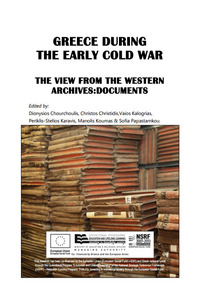Χουρχούλης, Διονύσης. Greece during the early Cold War : the view from the Western Archives
- Έργο (αυτοτελές έργο)
- Βιβλιογραφικά συλλογικά έργα
- 2015
- Αγγλικά
-
- W0396
-
-
Greece‘s relationship with the West during the Cold War is one of the most hotlydebated issues of contemporary Greek history. Although much remains to be done, there is an extensive and growing bibliography on this subject, from the Greek civil war until the country‘s accession to the EEC in the late 1970s. Recently, attempts are also being made to expand the discussion in the Greek 1980s. Needless to say, this bibliography has evolved through time. Initially, the focus was on the role of the Great Powers (the title of the book by Stephen G. Xydis in 1963), and the conceptual approach was compatible with the ―orthodox‖ school of thought, prevalent at that time in the West. Later on, new approaches rose. The Greek ―revisionism‖ in the late 1960s and early 1970s focused on the alleged role of the United States in the imposition of the Colonels‘ dictatorship, and thus again reproduced the omnipresent, in Greek debates, concept of a small country, suffering the interventions of the infamous ―foreign factor‖ (or, more amusingly in the Greek language, ―foreign finger‖ – μέλνο δάθηπινο). The Junta caused a huge setback for Greek historical perceptions and culture. The hopeful efforts of other scholars – seeking to interpret developments as processes rather than as instances of imposition, and bring into the equation the role of the Greeks or the regional, mostly Balkan, actors themselves – were largely sidelined. It was only later, with the advent of new generations of historians during the 1990s and later, that this more functional approach was revived and to some extent expanded. We are now in a new era, in which the role of the Great Powers is being acknowledged, but the importance of Greek or regional actors is also underlined; developments are being interpreted as dynamic interactions rather than as static incidents; and the international perspective – the wider picture – allows scholars to advance more balanced assessments regarding Greece‘s Cold War experience.
(Από την εισαγωγή του έργου)
-
- Original: . - Rules: RDA


